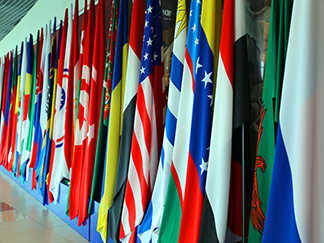How is foreign policy shaping the 2024 presidential campaign?
Aug. 6, 2024

Ongoing wars are being waged by U.S. allies in Ukraine and the Gaza Strip and there is a growing risk of broader conflicts in the Middle East and East Asia. The foreign policy credentials of former President Donald J. Trump and Vice President Kamala Harris provide some insight into how they might handle current and emerging conflicts as Commander in Chief.
Trump
Trump’s lack of formal foreign policy experience didn’t prevent him from being elected in 2016. In response to criticism about this, Trump pointed to his success in negotiating international business deals as a private citizen.
As a first-time candidate, Trump repeatedly attacked the Joint Comprehensive Plan of Action, better known as the Iran Nuclear Deal, as a “bad deal”. As president, he pulled the United States out of that agreement. He pressured US allies to increase their contributions to NATO, the centerpoint of US alliances in Europe. Trump successfully renegotiated NAFTA, a trade agreement between Canada, the United States, and Mexico in ways that brought the agreement into the 21st century by adding intellectual property rights protections, among other changes. Trump also made unilateral moves, such as moving the US Embassy in Israel to Jerusalem, that lacked broader international support.
However, Trump was not able to execute one of his core foreign policy promises - to withdraw US troops from Afghanistan. That happened almost nine months after Trump left office, under President Joe Biden. Trump has since criticized how the withdrawal was conducted, including attacks which led to the deaths of 11 US service members.
Foreign policy under the Trump administration was often confrontational while simultaneously pushing for the United States to ease its burden in the world. Although Trump has been described as an isolationist based on his America First agenda, he is likely to engage in strong military action if provoked. As Trump’s Vice Presidential running mate, JD Vance noted, when military action is needed, the US military will “punch hard”.
Harris
Harris is a newcomer to foreign policy circles. From 2017 to 2020, Harris was a U.S. Senator for California. Most of the votes she cast in the Senate relating to national defense issues were aimed to block the Trump administration’s foreign policy objectives, including repeated votes against the 2019 National Defense Authorization Act which serves as the Department of Defence’s budget.
Harris’s foreign policy experience stems mostly from her three and a half years as Vice President, during which she was explicitly tasked with addressing the root causes of irregular migration from Latin America to the United States. She traveled to Mexico, Guatemala, and Honduras as part of her efforts, the success of which is currently hotly debated.
Analysts have argued that Harris lacks a clear record on foreign policy issues and has no specific foreign policy doctrine or agenda. This makes it difficult to predict how she might react to a specific crisis or towards a particular adversary. Harris’s choice for Vice President, Tim Walz, regularly conducted business in China for about a decade and believes that China and the United States should move away from an adversarial relationship.
Recently, Harris has been engaged in a balancing act between internationalist and progressive democrats with respect to the Israel-Hamas War. She has affirmed Israel’s right to self defense while also arguing that the Palestinian people have a right to freedom, dignity and self-determination.
Change is Coming
U.S. foreign policy priorities are likely to shift significantly under the next administration, regardless of who is elected president. President Joe Biden’s internationalist wing of the democratic party is in decline, as it has been on the republican side for years. Tensions between those who consider Russia, China, and Iran to be major adversaries and those who seek to shed America’s role as the global policeman will continue to simmer. Whether a coherent foreign policy agenda will emerge from a Harris or second Trump administration remains to be seen.